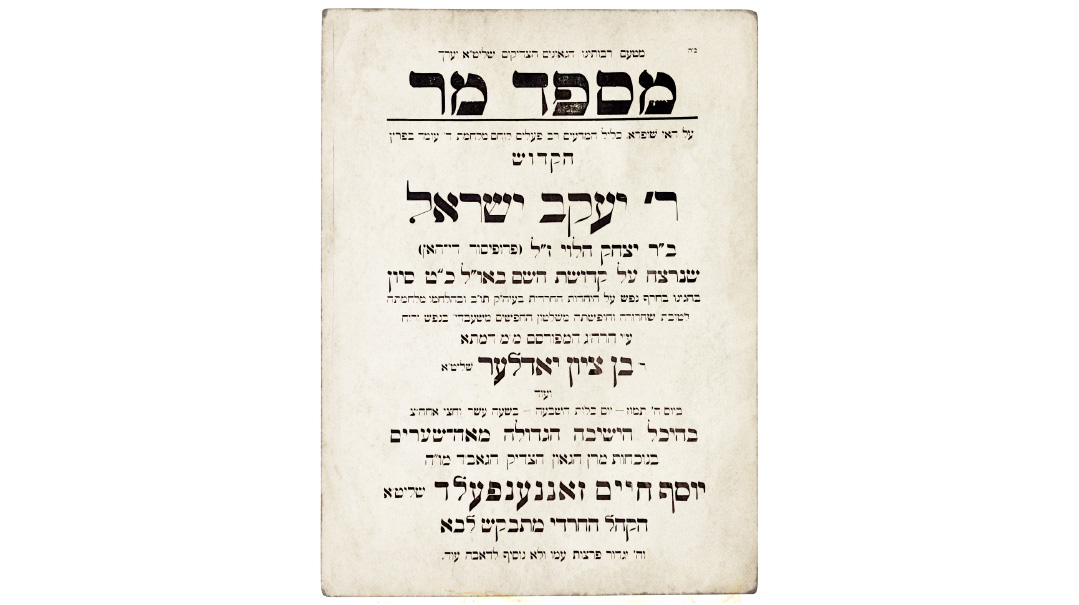The Beloved Dayan of the Badatz
| March 14, 2023“I deal with all of the pikuach nefesh questions resulting from those who fasted when they shouldn’t have in the first place.”

Title: The Beloved Dayan of the Badatz
Location: Jerusalem
Document: Poster
Time:1925
The gunshots that rang out on June 30, 1924, on Rechov Yaffo, outside the old Shaare Zedek Hospital building, announced the first political assassination in modern Jewish history. The victim was an enigmatic character named Dr. Jacob de Haan, who served as the “foreign secretary” of the nascent Eidah Hachareidis faction of the Old Yishuv, and was a close confidant of its leader, Rav Yosef Chaim Sonnenfeld.
Jacob de Haan, although childless himself, would give his name, Yisrael Yaakov, to a prominent figure of the succeeding generation. De Haan worked closely with a recent immigrant from Romania named Rav Aharon Fisher, whose general and linguistic knowledge were invaluable to Rav Yosef Chaim Sonnenfeld in enunciating his position vis-à-vis the British government and the outside world.
In the aftermath of de Haan’s assassination, Rav Aharon and his wife Devorah welcomed the birth of a son, who was named Yisrael Yaakov in his friend’s memory. That son would become Rav Yisrael Yaakov Fisher (1925–2003), the longtime rav of Jerusalem’s Zichron Moshe neighborhood, a dayan on the beis din of the Eidah Hachareidis, and one of the beloved poskim of the last century.
His father, Rav Aharon, was a colorful character. He had been drafted into the Romanian military as a young man, and the experience led him to dedicate the remainder of his life to learning Torah in Jerusalem. There he developed a close relationship with Rav Sonnenfeld, with Rav Shlomo Eliezer Alefandri (the Saba Kadisha), and others. He served as baal korei in Batei Nathan and Meah Shearim, and donned his old Romanian army boots during a heavy 1920 snowfall to distribute bread to homebound neighbors. Upon Rav Sonnenfeld’s advice, he applied for a position at a Tel Aviv school affiliated with Mizrachi, teaching foreign languages there until his contract was terminated due to his unwillingness to change his white Yerushalmi yarmulke for a more modern look.
That determination would rub off on his son. A young Rav Yisrael Yaakov thrived at Eitz Chaim Yeshivah as a prominent talmid of Rav Isser Zalman Meltzer. Following a day of learning at Eitz Chaim, he’d shift over to the Aleksander shtibel because the gabbai there provided longer candles than the other neighborhood shuls, enabling him to continue his studies well into the night. Shabbos afternoons would find him pacing the courtyard of Batei Nathan engaged in deep Torah discussions with Rav Zelig Reuven Bengis.
Following years of poverty, Rav Yisrael Yaakov was hired as the rabbi of the Zichron Moshe neighborhood in the 1960s. He also held a teaching position in Eitz Chaim. After he was appointed dayan on the beis din of the Eidah Hachareidis in 1975, his opinion was sought on every conceivable issue, and his expertise in specific areas of halachah was renowned.
He was famous for his relatively lenient position regarding fasting for those who were unwell, even on Yom Kippur. When asked about his permissive opinion, he quipped, “I deal with all of the pikuach nefesh questions resulting from those who fasted when they shouldn’t have in the first place.”
His wife Rebbetzin Malka would answer the phone and assist him with answering halachic queries, and, knowledgeable as she was about her husband’s reasoning, she’d often tell callers how he would pasken, with Rav Yisrael Yaakov’s full support.
Given his Torah scholarship and reputation as a posek, many would seek out his advice on a myriad of issues. He encouraged the use of natural remedies for a variety of ailments, and would guide petitioners in the exact ingredients for various potions he’d recommend. Behind the veneer of greatness lay warmth, accessibility, and Yerushalmi wit, which made him a beloved figure among all strata of society until his passing in 2003.
Which Fisher?
Dayan Fisher’s uncle was Shmaya Theodore Fisher, a prominent lawyer who represented the Transylvanian Jewish community in the Romanian parliament. Subsequent historiography confused him with Dr. Jozef Fischer, no relation, another prominent Zionist leader from Transylvania who was the father-in-law of the controversial Hungarian lawyer and activist Rudolf Kastner, and played a role in the rescue of the Satmar Rav and others during the Holocaust.
Changing the Status Quo
Scion of a family prominent in the Hungarian rabbinate, Dayan Fisher’s grandfather Rav Shlomo Fisher was a student of both the Ksav Sofer and the Wurzburg Rav, Rav Yitzchak Dov Bamberger. He first served as rabbi in Munich before assuming the position in Karlsburg, Transylvania (today Alba Iulia, Romania). With the divisiveness rife in Hungarian Jewish communal life of the 19th century, Karlsburg was officially a “status quo” community upon his arrival. Over the years he steered the course for its transition to an Orthodox community.
The 20th yahrtzeit of Rav Yisrael Yaakov Fisher is this Shabbos, 25 Adar.
An article by Rav Yechiel Sternberg originally published in the Yeshurun journal was utilized in the preparation of this column.
(Originally featured in Mishpacha, Issue 953)
Oops! We could not locate your form.

